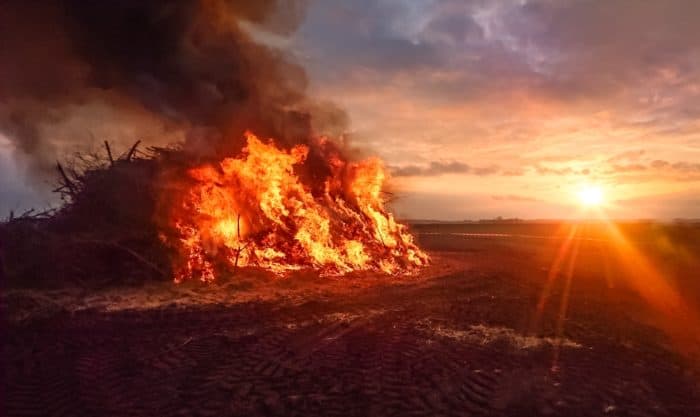Information You Need to Know if There is a Fire on Your Farm

Loss due to a farm fire is a tragic experience. Losing property, equipment, animals, livestock, and product is emotionally challenging and it can lead to lengthy downtime for your farm and business. The loss of productivity can put your entire operation at risk.
There are many causes of farm fires, including lightning, misuse of equipment (such as using arc welders or grinders in the presence of combustible materials), smoking inside farm buildings, the use of combustible gases, uncleared brush and debris, and faulty heating or electrical equipment. Whatever the cause, farm insurance should help you rebuild.
After there is a fire on your farm, there are several questions that may be on the top of your mind.
#1 What Does Your Farm Insurance Policy Cover?
One of the first things you should do after a farm fire is to contact your insurance company. Notify them of the fire and request your Long Form Insurance Policy. This will contain detailed information about your policy, including coverage limits and the types of loss covered.
Most farm insurance policies cover farm outbuildings, equipment and tools, machinery, hay and feed, livestock, and liability. Many farm insurance companies will require you to specifically add on coverage for things like fencing, and when you start dealing with the insurance adjuster you may find that old or poorly maintained equipment is not covered.
#2 How Quickly Can You Get Back Up and Running?
The biggest concern of farmers after a fire is usually how long it will take to get back up and running. Minimizing downtime can be key to your farming operation’s survival, and the speed of your insurance claim can go a long way toward expediting the rebuilding process.
With insurance paying for the building repairs, replacing equipment, and recouping the value of livestock and product, you will want to file your insurance claim as soon as possible and negotiate a satisfactory payment with the insurance company. Don’t hesitate to contact us for a free consultation to see how we can assist in the navigation and negotiation of your claim.
Fortunately, there are many success stories of Canadian farming operations bouncing back after devastating fires. Above all else, receiving fulsome compensation from the insurance company is instrumental in getting an operation back up-and-running.
#3 How Do You Get Reimbursed for Farm Equipment?
Losing heavy or critical equipment in a fire can be devastating for farmers. The cost of farm equipment is significant, including tractors, planters, combines, balers, sprayers, loaders, and any other machinery you need for your operations. Your farm depends on this equipment to operate and replacing it after a loss can be expensive.
Reimbursement for lost farm equipment depends heavily on the on the terms of your specific insurance coverage. Equipment will be reimbursed based on either its Replacement Cost or its Actual Cash Value.
Replacement Cost – If your farm insurance policy offers Replacement Cost compensation for lost equipment, your claim will be based on the cost to purchase the same equipment today, up to your coverage limit. Replacement Cost insurance can help you repurchase the equipment you need to get back up-and-running as quickly as possible. You will have to work with an insurance adjuster, describing and documenting the value the lost farm equipment, as well as demonstrating its replacement cost.
Actual Cash Value – Be careful with Actual Cash Value insurance, as this does not refer to the money you spent on the equipment, but rather its actual value at the time of the loss. Farm equipment, like most business equipment, depreciates over time, meaning the Actual Cash Value can be much lower than the amount you paid for the item originally or its current replacement cost.
Farming Equipment may also be subject to a security agreement if it was purchased through some financing options. This will also affect the process and result of a reimbursement claim.
#4 How Is the Value of Lost Commodities Treated?
Unlike your personal home or traditional businesses, some of the most valuable losses come from what would be considered commodities, including product and livestock. If you are wondering what happens to your contents in a fire on a farm, keep in mind that with business insurance, your equipment, inventory (like commodities), and contents (such as supplies) are treated separately.
Most farm policies include a form of livestock insurance that protects from perils such as fire, lightning, and explosions, or even earthquakes, floods, and theft. The coverage is referred to as limited animal mortality coverage, which covers accidental death of animals, but not animal mortality as a result of old age or death. Livestock may be insured individually or as a herd (i.e., 100 head of cattle). High-value animals such as breeding animals are typically insured individually.
Once you have a copy of your insurance policy, verify whether you have livestock insurance, and become familiar with the coverage terms so that you can frame your claim in the most efficient way. For example, if your cattle are insured as a herd, it may make more sense to collect all of the required proofs and submit them as one package, rather than on an animal-by-animal basis.
#5 Does Farm Insurance Cover Personal and Business Property?
It can. For family-operated farms, there are insurance policies that cover your home and personal property as well as farm buildings, equipment, and contents. However, these are typically just a bundle covering multiple types of insurance (home insurance and farm insurance), similar to a home and auto bundle. In other words, even though they are bundled, the claims process for the personal contents may be separate from the process for the farm contents. Additionally, equipment will be insured differently depending on whether the item is for personal use or farm operations. For example, a tractor would be insured as farm equipment, but a lawn mower is likely insured as personal contents.
Farm insurance should also include Voluntary Fire Fighting Coverage. It is commonplace in provinces such as Alberta for rural municipalities to share fire department services. Check the terms and limits on your farm insurance policy if you live in an area under volunteer fire department coverage, as fighting a large fire may cost up to tens of thousands of dollars. You can also call your municipality and ask about fire charges.
For farm operators who have gone through a fire, getting back up and running is about more than emotional recovery, its about safeguarding their livelihood and managing the expectations and lives of their farmhands and families. Your farm fire insurance claim can help you rebuild and recover sooner.



